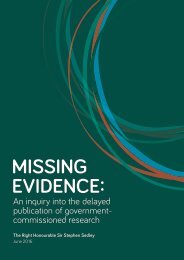INSIGHT & INSPIRATION FROM APHA’S 2012 MIDYEAR MEETING
INSIGHT & INSPIRATION FROM APHA’S 2012 MIDYEAR MEETING
INSIGHT & INSPIRATION FROM APHA’S 2012 MIDYEAR MEETING
Create successful ePaper yourself
Turn your PDF publications into a flip-book with our unique Google optimized e-Paper software.
1<br />
Survive All In This Friends Prevention, Strategies<br />
& Thrive Together For Health Opportunity & Equity for Health<br />
Letter from Dr. Benjamin<br />
Dear fellow public health practitioners, researchers, educators and supporters,<br />
On Saturday, Nov. 7, 2009 — the first day of APHA’s 137th Annual Meeting in Philadelphia —<br />
the U.S. House of Representatives passed its version of a bill that would eventually lead to the<br />
historic passage of real health reform. It was a pretty good day for public health. Fast forward<br />
to June 28, <strong>2012</strong> — the closing day of APHA’s Midyear Meeting in Charlotte, N.C. — when the<br />
Supreme Court upheld nearly every provision of the Patient Protection and Affordable Care Act.<br />
That was a very good day for public health.<br />
Hearing the long-awaited news surrounded by hundreds of fellow public health workers —<br />
the very people who are bearing witness to the law’s real impact on people’s health and wellbeing<br />
— was incredible. But in typical public health fashion, after a few minutes filled with<br />
celebratory cheers, ecstatic hugs and audible sighs of relief, the conference room quickly<br />
filled with that determined energy to make a difference. It was time to get back to work.<br />
The Supreme Court’s decision was good news, but the Affordable Care Act and its landmark<br />
investments in public health and prevention are hardly on sturdy ground. Attempts to repeal the<br />
law or strip the law of funds to implement it will likely continue. This comes on top of serious<br />
cuts to federal, state and local public health budgets. At the same time in our communities,<br />
people are still becoming sick and disabled, and are dying from preventable disease and injury.<br />
Significant health disparities persist, shining a glaring light on our moral obligation as a nation<br />
to eliminate health inequity. The need for public health is clear, but — as was heard again and<br />
again in Charlotte — our resources and capacity are truly in peril.



